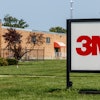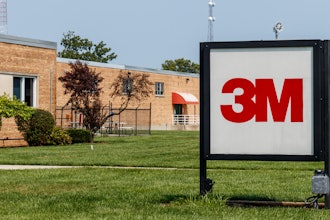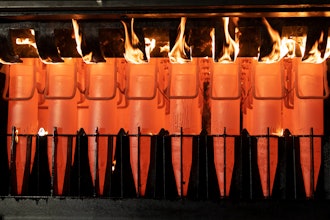
LITTLE ROCK, Ark. (AP) — Two pharmaceutical companies asked a federal judge Thursday to prevent Arkansas from using their drugs to execute seven inmates by the end of the month, saying they object to their products being used for capital punishment.
Fresenius Kabi USA and West-Ward Pharmaceuticals Corp. were granted permission to file a friend of the court brief in a lawsuit by the inmates aimed at halting the unprecedented execution schedule, set to begin Monday with the lethal injection of two condemned killers. Fresenius Kabi said it appeared that it had manufactured the potassium chloride the state plans to use, while West-Ward had previously been identified by The Associated Press as the likely manufacturer of the state's supply of midazolam.
"The use of the medicines in lethal injections runs counter to the manufacturers' mission to save and enhance patients' lives, and carries with it not only a public-health risk, but also reputational, fiscal and legal risks," the companies said in a filing with the court.
Arkansas prison officials announced last month they had obtained a new supply of potassium chloride, clearing the way for the executions to begin. The executions are scheduled to occur before Arkansas' supply of midazolam, a sedative used in flawed executions in other states, expires at the end of April.
A 2015 state law keeps the source of Arkansas' three lethal injection drugs secret. The Department of Correction, Gov. Asa Hutchinson's office and the attorney general's office declined to comment on Thursday's filing by the companies.
"We have made repeated as of yet unsuccessful representations in writing and in person to the governor's office, office of the attorney general and the Department of Corrections to confirm if they are in possession of our product which they intend to use in lethal injections, and if so to return it to us," Brooke Clarke, a spokeswoman for Hikma, West-Ward's parent company, said in a statement. Fresenius said it has made similar overtures to Hutchinson and his staff, but hasn't received any response.
Both companies said they've put strict controls on their supplies to ensure the drugs aren't used in capital punishment. Fresenius said its information indicated no sales of its potassium chloride directly or through its authorized distributors to the state's prison system.
"So we can only conclude Arkansas may have acquired this product from an unauthorized seller," Matt Kuhn, a spokesman for the company, said in a statement. "Pharmaceuticals obtained in this manner are at risk of adulteration or chemical change due to improper handling such as failure to maintain proper temperature levels during storage and transport."
The parent company of Fresenius is Fresenius Kabi in Germany. West-Ward's parent Hikma is based in London.
The AP last year used redacted drug labels to identify Hospira, which was purchased by Pfizer, as the likely manufacturer of the third drug in Arkansas' lethal injection protocol, vecuronium bromide. Pfizer has objected to the use of its drugs in lethal injections and has put controls in place to prevent them from being used in executions. In a statement on its website, Pfizer said a distributor had sold the drug to Arkansas without the company's knowledge. The company said it has asked the state twice to return any restricted Pfizer or Hospira drugs.
"We believe we have sought to appropriately enforce our policy and have fully explored everything within reason to seek the return of the product," Pfizer spokeswoman Rachel Hooper said in an email.
Under Arkansas' protocol, midazolam is used to sedate the inmate, vecuronium bromide then stops the inmate's breathing and potassium chloride stops the heart.
U.S. District Court Judge Kristine Baker is expected to rule Friday in the inmates' request to halt the executions. The inmates are challenging the compressed execution timetable, as well as the use of midazolam. The lawsuit is among a flurry of challenges aimed at halting the executions. A state judge earlier Thursday rejected a stay request by Bruce Ward, one of the two inmates facing lethal injection Monday night.
Arkansas has not executed an inmate since 2005 because of drug shortages and legal challenges. If carried out, the executions would mark the most inmates put to death by a state in such a short period in modern history.
Hutchinson defended the execution timeline earlier Thursday, saying he believed prison officials were prepared. He also said he believed the secrecy law had helped Arkansas in obtaining new supplies of its lethal injection drugs.
"I don't think we would have acquired the drugs that we have without that confidentiality agreement," Hutchinson said.






















